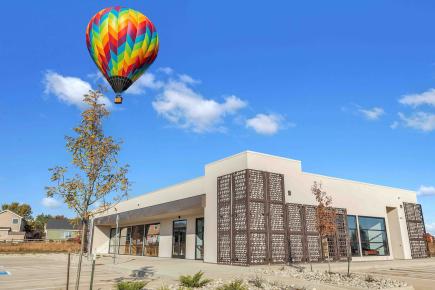
On the path toward sustainability, every step—whether big or small—is meaningful. For 2021 Best Practices Honorees Dr. Michael Koditek and Dr. Jeff Berger at Carbon Valley Eye Care in Frederick, Colo., their first step was a leap. They went all in.
Years ago, Dr. Koditek saw a Colorado Springs optometry practice featured in an e-newsletter and noted that the roof was completely covered in solar panels. His interest was piqued, and “it snowballed from there,” he said. Dr. Koditek called the owner of the practice out of the blue and asked to meet for dinner to learn more about what he was doing from a sustainability perspective.
Ultimately, that discussion inspired the doctors to make significant investments in the sustainability of their practice. They installed solar panels on their roof so the office operates on 100% renewable energy, and all of their lights are LEDs. In addition, eco-friendly thermostats feature motion sensors, so the HVAC system is only working to heat and cool areas of the office in use. Carbon Valley Eye Care offers contact lens recycling, and Dr. Koditek makes sure everyone at the practice participates in some of the more basic “green” measures as well.
“I’m a recycling nut. I’m constantly reminding my staff not to throw things away that could be recycled,” he said.
Dr. Koditek was excited to learn about CooperVision’s partnership with Plastic Bank®, which makes clariti® 1 day[1],[2]* the first net plastic neutral contact lens3. For every box of clariti® 1 day distributed in the United States since the start of 2021, CooperVision funds the collection, processing, and reuse of general plastic waste that is equal to the weight of the plastic contained in clariti® 1 day lenses and packaging.
“Anything you can do to make 1-day lenses more attractive to your patients is a good idea, and this is a way to do that,” Dr. Koditek said.

Carbon Valley Eye Care currently has approximately 57% of its contact lens wearers in 1-day lenses, but the doctors are working to upgrade even more of their patients to the modality.
“We always say what is good for the patient is good for the practice. If you ask any optometrist what contact lenses their family members wear—they’re 100% in 1-day lenses,” explained Dr. Koditek. “So why isn’t that the case with every patient?”
Dr. Koditek said that the most common reason is cost, but the exceptional everyday value of clariti® 1 day4 helps overcome that barrier. “And now wearing clariti® 1 day can make a positive impact on the environment as well.”
The mission behind the clariti® 1 day plastic neutral initiative strikes a chord with Dr. Koditek. As an avid fisherman, he makes every effort to pick up plastic each time he goes to the river. He believes in doing his part—personally, and through his practice.
“Taking measures to be more sustainable—it’s really the right thing to do,” he said.
Do you want to make your practice more “green”? Fortunately, sustainability is scalable—changes big and small make a world of difference. Check out our new sustainability checklist for ideas!
*Based on top 4 global contact lens manufacturers.
References
1. clariti® 1 day is defined as orders and includes clariti® 1 day sphere, clariti® 1 day toric, and clariti® 1 day multifocal product sold & distributed by CooperVision in the US.
2. CVI data on file 2020. Sustainability report, clariti® 1 day in US.
3. Based on top 4 global contact lens manufacturers.
4. CVI data on file 2020. prospective, double masked, bilateral, randomized cross-over dispensing 1-week study, with clariti® 1 day and 1-DAY ACUVUE® MOIST in FRP SiHy wearers. N=55; p<0.01.








